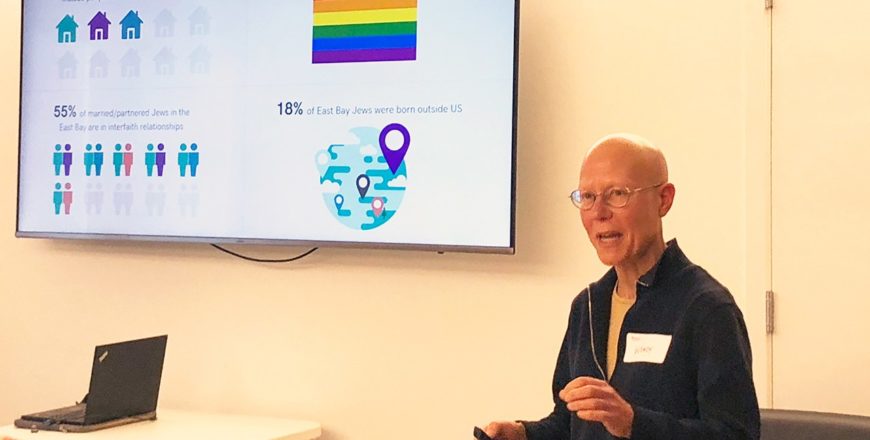
Local Jewish orgs don’t include salaries on job listings, survey shows. That can result in women earning less.
Findings from a new survey suggest that many Jewish organizations in the Bay Area leave one important detail out of their job postings: How much they’ll pay. It’s an important metric that, when hidden, tends to increase the pay gap between men and women.
A gender pay equity survey conducted in the spring by a five-person team of Bay Area leaders, all alumni of Wexner Foundation Fellowships, revealed the opacity of the pay scale for jobs posted across Bay Area Jewish nonprofits. Particularly among larger organizations, salary ranges were rarely disclosed on job postings for top-tier positions.
Understanding the importance of salary transparency in closing the gender pay gap, this group of Bay Area leaders decided to survey the approximately 200 local Jewish organizations to learn more about their pay disclosure policies. Eighty-five responded.
For more than a decade, research continues to show that when salary ranges and pay expectations are not disclosed to job applicants, women will get paid less than men for comparable work.
“Studies show that when job applicants are clearly informed about the context for negotiations, including the types of compensation, benefits, or conditions that are negotiable, or the typical pay for the position, women are more willing to negotiate, more successful in negotiating, and the gender wage gap narrows,” according to a fact sheet on Salary Range and Transparency published in 2020 by the National Women’s Law Center.
The impetus for the survey traces back to a 2019 “Summit on Gender” conference in Washington, D.C., that brought Wexner alumni together to collaborate on projects geared toward improving gender equity. That is where Danny Grossman, CEO of the S.F.-based Jewish Community Federation and Endowment Fund, consulting firm founder Wendy Rosov, Wells Fargo’s Judith Goldkrand, Stacy Mason of Women Count and Adam Weisberg of Berkeley’s Urban Adamah all connected.
Rosov, founder and principal of Rosov Consulting, a Berkeley-based professional services firm for Jewish nonprofits, lent her company’s expertise to design and distribute the survey and collect the data. She said the 85 organizations that responded included 25 synagogues, six Chabad centers, five Jewish day schools, four Jewish camps and 45 other Jewish nonprofits.
The results showed that fewer than half, 47 percent, included salary ranges in all of their job postings; 27 percent were not including salary ranges in any of their postings.
Rosov surmises that among the 115 organizations that did not respond to the survey, fewer disclose salaries in job postings. “The people who responded to the survey are likely the ones who are already doing it,” she said.
A majority of the respondents, 62 percent, represent small organizations with fewer than 20 full-time staff members. The rest split evenly between medium-size (21-45 full-time staff) and large (46+ full-time staff).
The survey found that the large organizations tend to post salary ranges less often; slightly more than half never include them. When salary ranges are included in job postings, they’re mostly posted for seasonal (61 percent), entry level (72 percent) and middle management (78 percent) positions.
Most people working at Jewish nonprofits are women. But most CEOs of Jewish nonprofits — especially at the largest organizations — are men.
Less than a third of respondents include salary ranges for senior management positions (28 percent), and only 16 percent post salaries for executive C-suite positions, “and this is where we see a lot of that sort of gender inequity happen,” Rosov said. “Senior management and C-suite positions.”
An August 2021 report by LeadingEdge.org, a leadership pipeline for Jewish nonprofits, found that the majority of people leading Jewish organizations nationwide, and earning the highest salaries, are men.
“Most people working at Jewish nonprofits are women. But most CEOs of Jewish nonprofits — especially at the largest organizations — are men,” according to “The Gender Gap in Jewish Nonprofit Leadership” report.
Judith Goldkrand, national women’s segment leader at Wells Fargo, is encouraged by the results of the survey’s final question — asking if the organizations would consider changing their hiring practices.
“I was most pleased to see the number of organizations that said, I’d like to learn more, I’d like to get more information,” Goldkrand said. “We brought to life an issue that, whether they’ve been thinking about it already or not, they were open to the concept.”
And 82 percent of respondents said they’d consider taking steps to change their hiring practices to contribute to gender equity.
“When asked what they need help with, they most commonly say, sharing best practices, help with analysis of their current practices and salary caps,” Grossman said.
The group is preparing to facilitate and fund ways to support organizations in making those changes, with support from the Wexner Foundation, which funds educational and leadership programming for young professionals through fellowships and supports Jewish philanthropic projects.
There has not been a comprehensive study on the exact pay gap between men and women in Jewish organizations since 2010, but Grossman said the focus of the local survey intentionally avoided asking financially specific and potentially sensitive questions in order to elicit more responses.
“I think we know that the issue of pay inequity is real. Whether we know precisely, you know how real or formal or what the disparity is, it was less important to us than implementing measures that could further close the gap,” Grossman said.
The group is optimistic change will come, and realistic about it taking some time.
“These things have to change one organization at a time,” Rosov said. “There’s not going to be a sea change overnight around this.”
published in J: The Jewish News of Northern California, November 1, 2021, by Emma Goss




